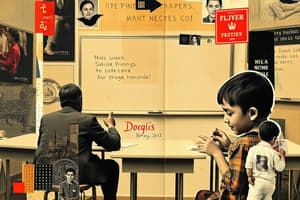Podcast
Questions and Answers
Which pedagogical technique primarily focuses on engaging students through dialogue and questioning?
Which pedagogical technique primarily focuses on engaging students through dialogue and questioning?
- Socratic Method (correct)
- Differentiated Instruction
- Active Learning
- Cooperative Learning
What is the purpose of differentiated instruction in the classroom?
What is the purpose of differentiated instruction in the classroom?
- To integrate technology in learning
- To promote teamwork among students
- To establish strict discipline among students
- To tailor teaching strategies for diverse learning needs (correct)
Which classroom management strategy focuses on creating a supportive classroom culture?
Which classroom management strategy focuses on creating a supportive classroom culture?
- Establishing Rules
- Monitoring Behavior
- Creating a Positive Environment (correct)
- Positive Reinforcement
Which motivational factor is characterized by the desire to perform an activity for its inherent satisfaction?
Which motivational factor is characterized by the desire to perform an activity for its inherent satisfaction?
What aspect does curriculum design focus on to ensure effectiveness?
What aspect does curriculum design focus on to ensure effectiveness?
Which learning theory emphasizes the role of cognitive processes and experiences in understanding how people learn?
Which learning theory emphasizes the role of cognitive processes and experiences in understanding how people learn?
What is a key feature of self-regulated learning?
What is a key feature of self-regulated learning?
Which of the following is NOT a component of effective feedback mechanisms in curriculum development?
Which of the following is NOT a component of effective feedback mechanisms in curriculum development?
Flashcards are hidden until you start studying
Study Notes
Teaching as a Profession
Pedagogical Techniques
- Active Learning: Engages students through discussion, problem-solving, and group work.
- Differentiated Instruction: Tailors teaching strategies to meet diverse learning needs.
- Cooperative Learning: Promotes teamwork and collaboration among students.
- Socratic Method: Encourages critical thinking through questioning and dialogue.
- Technology Integration: Utilizes digital tools to enhance learning experiences.
Classroom Management
- Establishing Rules: Set clear expectations and guidelines for behavior.
- Positive Reinforcement: Use rewards to encourage desired behaviors.
- Monitoring Behavior: Observe student interactions and address issues promptly.
- Conflict Resolution: Implement strategies to mediate and resolve disputes.
- Creating a Positive Environment: Foster an inclusive and supportive classroom culture.
Educational Psychology
- Learning Theories: Understand behaviorism, cognitivism, and constructivism to inform teaching practices.
- Developmental Stages: Recognize cognitive, emotional, and social development in students.
- Motivation: Explore intrinsic and extrinsic factors that influence student engagement.
- Learning Styles: Acknowledge various learning preferences (visual, auditory, kinesthetic).
- Self-Regulated Learning: Encourage students to set goals and monitor their own progress.
Curriculum Development
- Curriculum Design: Align objectives with standards and student needs.
- Integration of Skills: Incorporate 21st-century skills (critical thinking, collaboration) into curricula.
- Cultural Relevance: Ensure content reflects diverse backgrounds and perspectives.
- Feedback Mechanisms: Use input from stakeholders (teachers, parents, students) to improve curriculum.
- Evaluation and Revision: Regularly assess curriculum effectiveness and make necessary adjustments.
Assessment Methods
- Formative Assessment: Ongoing evaluations (quizzes, discussions) to monitor student learning.
- Summative Assessment: Comprehensive evaluations (exams, projects) at the end of a learning unit.
- Standardized Testing: Use of tests designed to measure student performance against a uniform standard.
- Authentic Assessment: Assess student skills through real-world tasks and applications.
- Feedback: Provide constructive feedback to enhance student learning and inform future instruction.
Teaching as a Profession
Pedagogical Techniques
- Active Learning involves interactive methods like discussions and problem-solving to engage students in their learning process.
- Differentiated Instruction adapts teaching methods to cater to varied learning abilities and styles in the classroom.
- Cooperative Learning emphasizes teamwork, allowing students to work together towards common academic goals.
- Socratic Method utilizes questioning to stimulate critical thinking and encourage in-depth dialogue among students.
- Technology Integration incorporates digital tools to support and enhance educational experiences and learning outcomes.
Classroom Management
- Establishing Rules creates a foundation for student conduct, setting clear expectations for behavior in the classroom.
- Positive Reinforcement involves rewarding students for exhibiting desired behaviors, fostering a motivating environment.
- Monitoring Behavior requires teachers to observe student interactions actively and address behavioral issues timely.
- Conflict Resolution includes strategies for helping students mediate disputes and develop problem-solving skills.
- Creating a Positive Environment aims to build a classroom culture that is inclusive, supportive, and conducive to learning.
Educational Psychology
- Learning Theories cover behaviorism, cognitivism, and constructivism, providing frameworks that inform effective teaching methodologies.
- Developmental Stages highlight the importance of recognizing students' cognitive, emotional, and social growth when planning lessons.
- Motivation is influenced by both intrinsic (internal desire) and extrinsic (external rewards) factors, affecting student engagement levels.
- Learning Styles refer to individual preferences in learning (visual, auditory, kinesthetic), and teachers should accommodate these differences.
- Self-Regulated Learning encourages students to take initiative in setting educational goals and tracking their own academic progress.
Curriculum Development
- Curriculum Design is focused on aligning educational objectives with educational standards and the needs of students.
- Integration of Skills involves embedding critical 21st-century skills, such as collaboration and critical thinking, into curricular frameworks.
- Cultural Relevance ensures that curriculum content is reflective of diverse backgrounds and perspectives, promoting inclusivity.
- Feedback Mechanisms involve gathering insights from various stakeholders—teachers, parents, and students—to enhance curriculum quality.
- Evaluation and Revision require ongoing assessment of curriculum effectiveness, allowing for responsive adjustments to meet educational goals.
Assessment Methods
- Formative Assessment consists of regular evaluations (like quizzes and class discussions) used to monitor student learning progress throughout a course.
- Summative Assessment encompasses final evaluations (such as exams and projects) that measure student learning at the end of a unit.
- Standardized Testing is utilized to assess student performance in comparison to a uniform standard, providing measurable outcomes.
- Authentic Assessment evaluates students through real-life tasks and applications, reflecting their practical skills and knowledge.
- Feedback is essential for enhancing student learning, as it provides guidance on performance and informs future teaching strategies.
Studying That Suits You
Use AI to generate personalized quizzes and flashcards to suit your learning preferences.



